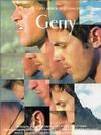|
|
||||
|
|
by Jeffrey Chen  Two men are lost in a desert. That sounds like the beginning of a joke, but it's actually the premise of Gerry, a movie that invites viewers to experience what it's like to have uncaring Nature slowly destroy you. This kind of open-to-interpretation movie can hit or miss, depending on whether or not you are engaged by its hypnotic visuals, and whether or not the feelings it evokes from you are interesting, memorable, or intense. And it's the kind of movie Joe and Jane Multiplex might walk out of. A few people did walk out of the theater where I watched this film. For those of us who stayed, Gerry offered an unusual existential drama. Two young men (Matt Damon and Casey Affleck), who call each other "Gerry," have stopped off in some unnamed desert to participate on a nature hike. They decide to veer from the trail and blaze one of their own, but soon find themselves unable to figure out their bearings. Both men come across as regular young American males, although Damon's Gerry has the stronger, more assertive personality. The situation starts off in a somewhat amusing way, as if this is just a minor dilemma that will soon correct itself. The two have minimal conversation, but when they do talk their use of shorthand and inside slang displays the closeness they have with each other. After finding some high ground on which to survey the surrounding area, they see no signs of civilization or water, and their quandary becomes more dire. The last half of the movie fills its time with long shots of the pair just walking, resting, and walking. By this point, how the pair got into this plight doesn't matter anymore. What they used to do back home doesn't matter anymore. Who they are doesn't even matter anymore. Trudging through the unending desert gives the Gerrys plenty of time to think, but whatever they're thinking remains private. We just see their faces, their contemplative stares while resting, their reactions in the face of despair. At one point, Affleck's Gerry starts to lament, prompting Damon's Gerry to snap at him, "Don't cry." The differences in their personalities come more to the fore, and will ultimately contribute to the outcome of their journey. Gerry gives its audience a mercilessly accurate portrayal of being lost -- along with plenty of time to think in the process. And what better way to convey the desolation the pair faces than simply to show the two walking or resting in what seems like consecutive 10-minute-long uninterrupted segments? The viewer is invited not only to wonder what he or she would do in such a situation, but also to consider larger ideas of man vs. nature, the ultimate insignificance of civilization, and the pathway from immaturity to maturity. Actually, the more I think about it, the more I see Gerry as a purer, more minimal version of Deliverance, the 1972 movie in which four city-dwellers take a canoe trip and find out nature is so much bigger and meaner than the little civilized world from whence they came. However, Deliverance offered up a form of "primitive" man as an adversary; in Gerry, the desert alone is enough of a challenge. Along the way, Gerry offers striking visuals as a bonus. If Lawrence of Arabia gave us a desert as a hot sea consisting mostly of sky, sand, and horizon, Gerry shows us a desert with its mountain face on. Our two men walk through several types of terrain, from rocky, shrub-filled and cavernous to open and gravel-surfaced. They march on through day and night. Although appreciating the stark beauty of the untouched landscape is probably the last thing on their minds, cinema patrons staring at the screen are given much to admire. What, if anything, was this film trying to say? Each viewer will have his or her own unique interpretation. My movie-going partner for the evening thought it served as a metaphor for life itself -- specifically, a journey out of childhood and childishness. She mentioned the path the movie took: the two men started out by looking for a direction, filled their conversations with inanitities, then ended up facing a crisis in which they are lost with nothing as their guide. She reasoned they were both named Gerry because they actually represent two sides of one person -- a more childlike side and a more mature side. I enjoyed listening to that interpretation. It showed me what's positive about a movie like this: if you stay around to think about what you're seeing, the thoughts you come up with will be your rewards. (Released by ThinkFilm and rated "R" for language.) Review also posted at www.windowtothemovies.com. |
||
|
© 2024 - ReelTalk Movie Reviews Website designed by Dot Pitch Studios, LLC |



